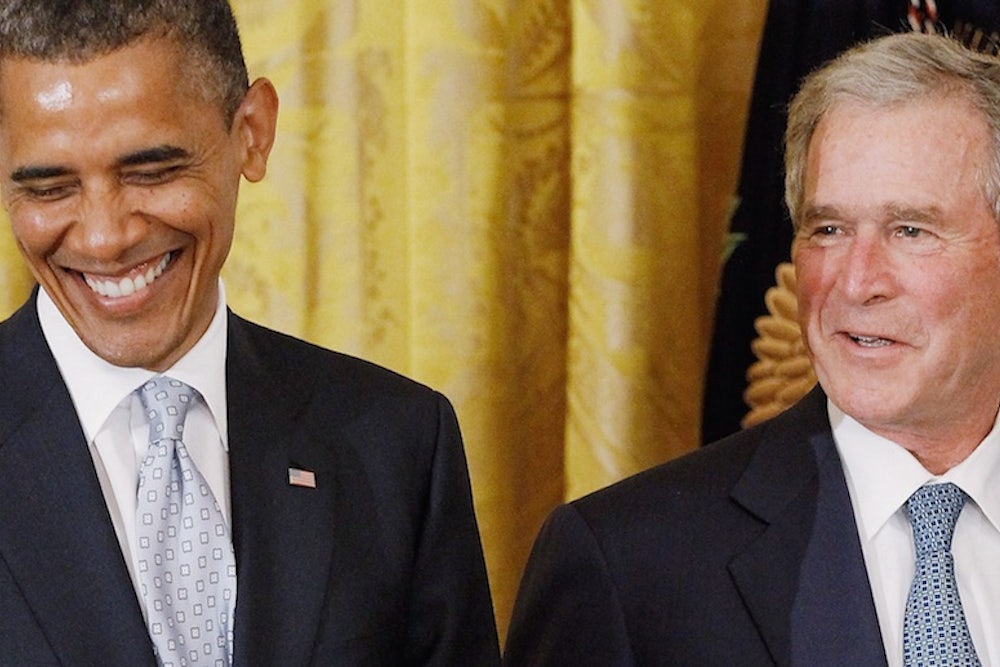If you have a working conscience, it is impossible to defend the merits of President Obama’s decision to shield architects of the Bush administration’s torture program from legal action. His justifications don’t draw him into complicity with the program, exactly, but they all fail a basic moral test. Possessed of ghoulish evidence that the program contravened U.S. and international law, in both design and execution, the Obama administration decided to ignore it for purposes that would’ve exposed anyone involved to prosecution or imprisonment.
By contrast, the practical justifications are at least arguable. Some are ridiculously flimsy: Is the creation of a permanent, lawless elite class really a price worth paying to avoid damaging morale at the CIA? The idea that investigating and prosecuting the torturers would amount to criminalizing politics begs the question that the people who designed the program were acting in what they believed was the best interest of the country, and not to generate “evidence” that vindicated their contentious foreign policies.
But even if you wish Obama had sent the Justice Department on a mission to put every last torturer on the witness stand, you can’t ignore the practical reality that securing convictions would've been difficult, and that acquitting a bunch of torturers isn’t the best way to maximize accountability and make government-sanctioned torture anathema (or impossible) in the future.
So the two questions before us now are whether the Obama administration’s approach to the old torture regime—eschewing prosecutions, resisting disclosure, prohibiting CIA torture via executive order—maximizes accountability and assures that, in Obama’s words, we “leave these techniques where they belong—in the past.”
The release of the Senate Intelligence Committee’s beleaguered torture report tested these propositions, and the Obama approach failed both.
Absent prosecutions, the question of how to secure accountability for anyone—but especially for the program architects—is extremely difficult to answer. If there were a greater national consensus that their activities were repugnant, then it’d be easier to marginalize the perpetrators. Under much different circumstances, you could imagine the Senate removing Jay Bybee from the federal court of appeals, or John Yoo losing his tenure at U.C. Berkeley. Dick Cheney would have no place in public life.
Under the actual circumstances we face, these people will continue to thrive within powerful networks of like-minded elites. That they’ll never be allowed to serve in government (or an elected branch of government) again isn’t accountability of any meaningful kind.
But the most troubling thing about Obama’s approach isn’t that it let everyone get away with torture, but that partial disclosure alone hasn’t created deterrence of any kind.
When asked whether the torture program might return, CIA Director John Brennan didn’t say never. He said, “I defer to future policymakers.”
If any of those future policymakers is of the Cheney bent, as many potential future policymakers surely will be, they’ll “do it again in a minute.”
In hindsight, Obama would have contained the country’s shameful torture impulse long enough to avoid staining his own legacy, while failing to eradicate it when he had the chance. To keep it bottled up forever, he’ll have to take a firmer stand. ACLU’s executive director, Anthony Romero, wants Obama to issue formal pardons for the torturers—to weaken the impunity with which torture architects operated, by putting their heirs on notice that a less conciliatory administration might prosecute them.
Another, complementary idea is for Obama to insist that Congress codify his executive order prohibiting torture and to single out the techniques enumerated in the torture report. If he means to “leave these techniques where they belong,” he should try in earnest make them illegal and, simultaneously, limit legal interrogation techniques to non-torturous ones, perhaps by demanding such provisions be included in a future defense authorization bill.
What he can’t do is argue that his look-only-forward approach to the torture program has relegated institutional torture to the past. His own CIA director won’t even argue that.
